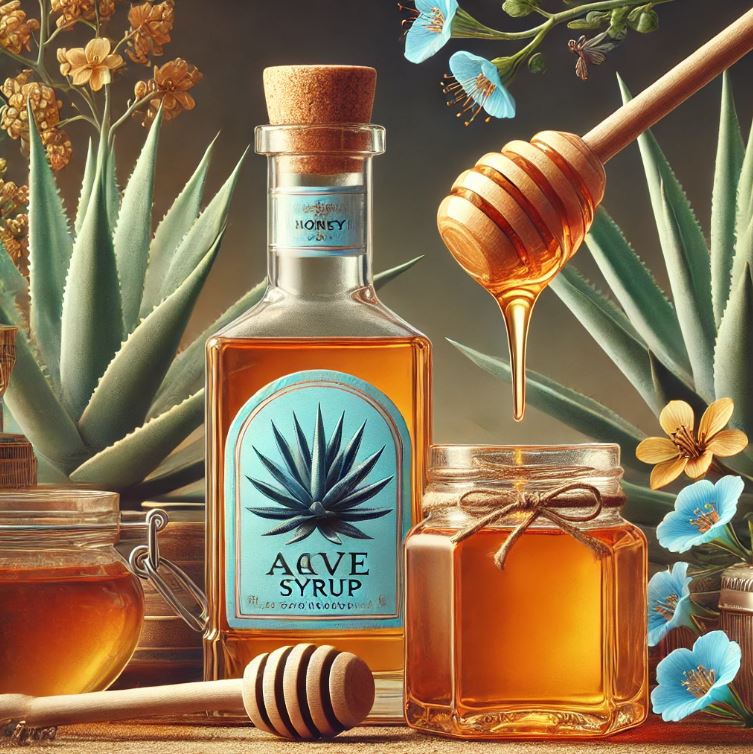What is the difference between agave and honey? Choosing between agave and honey as a sweetener can be a challenging decision, given their distinct origins, health benefits, and culinary uses. In this guide, we will explore the differences between these two popular natural sweeteners to help you make an informed choice.
Key Takeaways
- Agave is derived from the blue agave plant and is a vegan-friendly sweetener with a low glycemic index, making it suitable for people with diabetes.
- Honey is produced by bees from flower nectar and is known for its antioxidant and anti-inflammatory properties. It has a higher glycemic index than agave.
- Agave contains more fructose than honey, which can be a concern if consumed in excess.
- Honey offers additional health benefits such as soothing sore throats and boosting the immune system.
What is Agave?
Origins and Production
Agave nectar, also known as agave syrup, is harvested from the blue agave plant, native to Mexico. The sap is extracted from the plant’s core, filtered, and heated to convert its carbohydrates into sugars, primarily fructose (Discover Real Food in Texas) (EatingWell).
Health Benefits
- Low Glycemic Index: Agave nectar has a glycemic index of around 19, making it a preferable choice for those managing blood sugar levels (Discover Real Food in Texas).
- Rich in Phytonutrients: It contains trace amounts of vitamins and minerals, as well as phytonutrients with potential antioxidant effects (Bob’s Red Mill Natural Foods).
- Vegan-Friendly: As a plant-based sweetener, agave is suitable for vegans and those with specific dietary restrictions (EatingWell).
What is Honey?
Origins and Production
Honey is a sweet, viscous liquid produced by honeybees from flower nectar. The bees collect the nectar, transform it, and store it in honeycombs. Beekeepers then harvest the honey by removing the wax caps and extracting the honey from the combs (EatingWell) (Bob’s Red Mill Natural Foods).
Health Benefits
- Immune System Support: Local honey can help alleviate symptoms of seasonal allergies and boost overall immunity (Bob’s Red Mill Natural Foods).
- Soothes Sore Throats: Honey is known for its soothing properties and can help calm sore throats and reduce coughs (Bob’s Red Mill Natural Foods).
- Rich in Antioxidants: Honey contains phenolic acids and flavonoids that help reduce oxidative stress and may offer anti-inflammatory benefits (Discover Real Food in Texas).
Comparative Analysis
Nutritional Profile
- Calories: Both agave and honey have similar caloric content, with agave at approximately 60 calories per tablespoon and honey at around 64 calories (Discover Real Food in Texas).
- Sweetness: Agave is sweeter than honey, which means you may use less of it, potentially reducing overall calorie intake (Discover Real Food in Texas).
- Glycemic Index: Agave’s lower glycemic index (19) compared to honey (58-83) makes it a better option for blood sugar management (Discover Real Food in Texas).
Culinary Uses
Both agave and honey are versatile sweeteners used in various culinary applications. They can enhance the flavor of foods and beverages but offer different taste profiles:
- Agave: Has a mild, caramel-like flavor that works well in beverages, desserts, and sauces.
- Honey: Offers a floral and earthy taste, with over 300 varieties providing unique flavors and aromas depending on the flowers from which the nectar is collected (Discover Real Food in Texas).
Recent Developments – What is the Difference Between Agave and Honey?
Health Trends
- Plant-Based Diets: Agave is gaining popularity among those following vegan and plant-based diets as a natural, animal-free sweetener (EatingWell).
- Nutritional Research: Ongoing studies continue to explore the health benefits of both sweeteners, particularly their roles in blood sugar management and antioxidant properties (Bob’s Red Mill Natural Foods).
Top Experts and Entities
Nutritionists and Dietitians
- Kiersten Hickman: Freelance journalist covering food and health topics, emphasizing the nutritional differences between honey and agave (EatingWell).
- Emily Lachtrupp, M.S., RD: Registered dietitian providing insights on the health benefits and dietary uses of natural sweeteners (EatingWell).
Organizations
- USDA Food Database: Provides comprehensive nutritional data on agave and honey, highlighting their caloric and carbohydrate content (EatingWell).
- International Journal of Environmental Research and Public Health: Publishes studies on the health impacts of agave and honey, including their effects on blood sugar levels (EatingWell).
Conclusion
Both agave and honey offer unique benefits and can be used to enhance the flavor of your meals and beverages. Understanding their differences in terms of origin, nutritional content, and health benefits can help you choose the right sweetener for your needs.
Internal Links
- What is the Difference Between Club Soda and Sparkling Water?
- What is the Difference Between Brown and White Eggs?
- What is the Difference Between Latte and Cappuccino?
- What is the Difference Between Gelato and Ice Cream?
- What is the Difference Between a Stromboli and a Calzone?
Author
This article was written by HowDiff, experts in writing comparison articles across a variety of topics.
